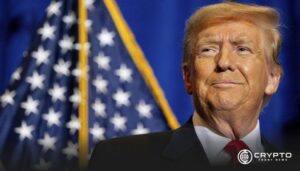- The Trump administration implemented global tariffs on April 5, targeting China, the EU, and Japan with significantly higher rates.
- Cryptocurrencies fell sharply after the announcement, with Bitcoin and Ether both losing value before showing mild recovery.
- US stock futures sank into bear market territory, triggering fresh concerns about prolonged volatility in global financial markets.
Cryptocurrency prices and US stock futures dropped sharply after the Trump administration raised global tariffs on April 5. The new measures imposed a 10 percent baseline tariff on all countries, with higher rates for key trading partners such as China at 34 percent, the European Union at 20 percent, and Japan at 24 percent.
The market entered a rapid decline after the proclamation was made. The price of Ethereum dropped more than 12 percent in a brief period where it peaked at $1575 and the entire crypto market value decreased by over 8 percent down to $2.5 trillion. Bitcoin increased 1.4 percent to $78,500 while Ether rose to $1,594 during the market uptick that occurred on April 7.
Market sentiment remains fragile. The Crypto Fear & Greed Index currently stands at 23 which signals extreme fear among cryptocurrency investors.
Analysts Cite Market Illiquidity and Timing of Sell-Off
Charlie Sherry, head of finance at Australian exchange BTC Markets, noted that weekends often see reduced liquidity in global markets. He explained that large sell-offs in such conditions tend to trigger sharper price drops due to lower trading volumes.
US stock futures also reflected the mounting concerns. S&P 500 futures dropped nearly 4 percent. The Dow Jones Industrial Average futures declined by more than 8 percent. Nasdaq futures also traded lower. The Kobeissi Letter reported that the drop placed the S&P 500 futures in bear market territory, with an average of $400 billion wiped out from markets daily over the past month.
US Administration Defends Tariff Strategy Amid Market Concerns
President Donald Trump reaffirmed his tariff strategy in a statement posted on Truth Social, arguing that the levies aim to reduce the United States’ trade deficits. Speaking aboard Air Force One, he said the policy was not intended to provoke a market sell-off but called it necessary to correct trade imbalances.
According to National Economic Council Director Kevin Hassett, over 50 countries have approached the White House to renegotiate trade terms. Meanwhile, US Treasury Secretary Scott Bessent stated in an earlier interview that the current tariff levels represent the upper limit, encouraging allies not to retaliate.





